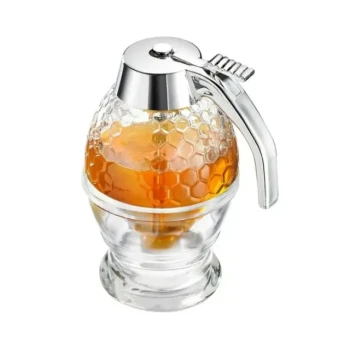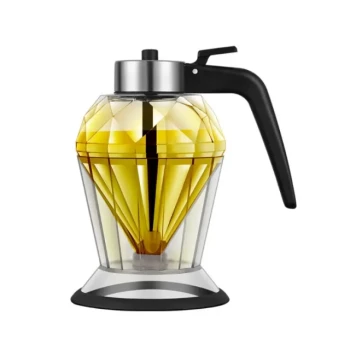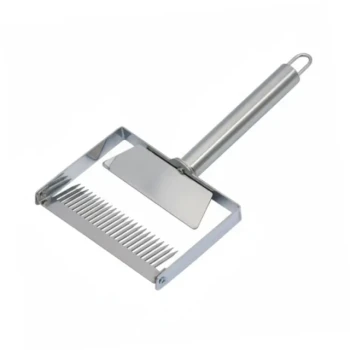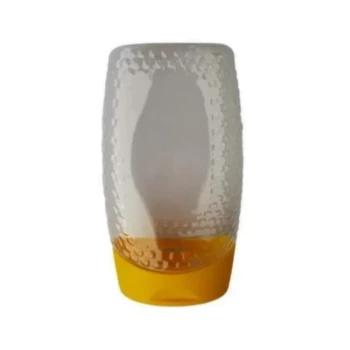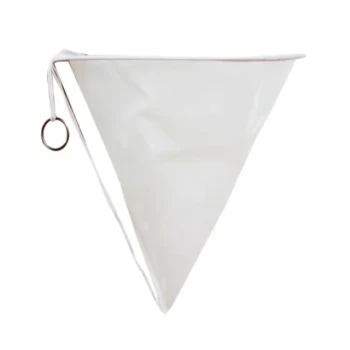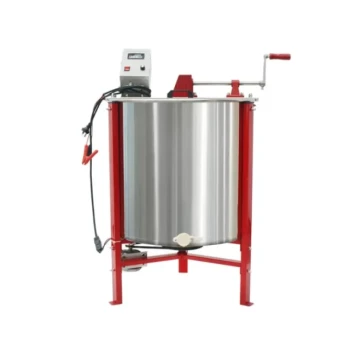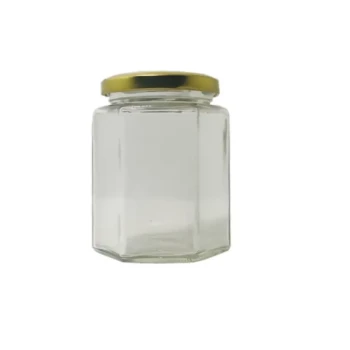In short, the primary health difference is that raw honey retains its natural enzymes, antioxidants, and bee pollen, which are largely destroyed or removed in processed honey. This means raw honey offers more significant antibacterial properties, a richer nutrient profile, and a slightly lower glycemic impact.
The choice between raw and processed honey is not just about taste or texture; it's a decision between a functional food with a full spectrum of natural compounds and a simple sweetener that has been stripped of its most valuable properties for the sake of consistency and shelf life.
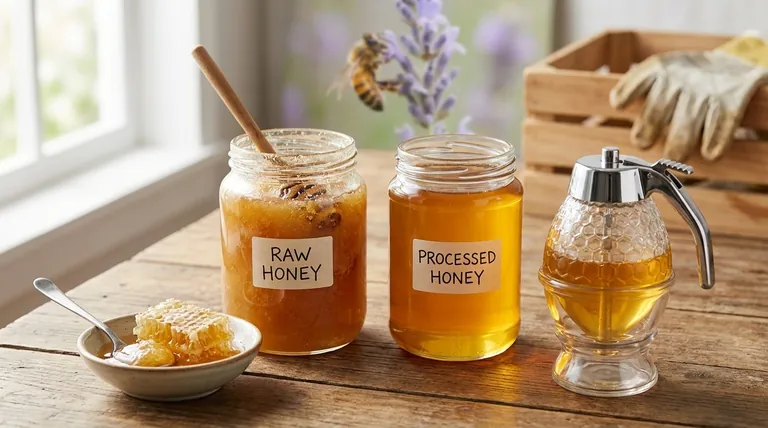
How Processing Changes Honey
To understand the health differences, you must first understand what "processing" entails. Commercial honey undergoes two main steps that alter its natural state.
Pasteurization: The Impact of Heat
Pasteurization involves heating honey to high temperatures. The primary goals are to destroy yeast cells that could cause fermentation, slow down the natural process of crystallization, and improve shelf life.
However, this heat degrades or destroys the delicate, heat-sensitive compounds responsible for many of honey's health benefits. This includes crucial enzymes like diastase and invertase.
Filtration: Removing Natural Particles
After heating, most commercial honey is finely filtered. This process removes small particles, including bee pollen, small wax bits, and other microscopic solids.
The goal is to create the perfectly clear, smooth liquid consumers expect. While this improves appearance, it also removes bee pollen, a source of vitamins, amino acids, and antioxidants.
The Core Health Differences Explained
The removal of natural compounds during processing directly impacts honey's nutritional and therapeutic value.
Antioxidant Content
Raw honey is rich in antioxidants, including phenolic acids and flavonoids. These compounds help your body fight cellular damage from free radicals, reducing oxidative stress. The heat from pasteurization significantly reduces this antioxidant capacity.
Natural Enzyme Activity
Raw honey contains natural enzymes created by bees, which are believed to aid in our own digestion. Processed honey is often called "dead" honey because the pasteurization process destroys virtually all of this beneficial enzyme activity.
Antibacterial and Antimicrobial Power
All honey has some antibacterial properties due to its low water content and acidity. However, raw honey's effects are more potent, partly because its active enzymes can produce small amounts of hydrogen peroxide, a natural antimicrobial agent. This effect is diminished in processed honey.
The Value of Bee Pollen
Bee pollen, which is filtered out of processed honey, is a nutritionally complex substance. It contains proteins, vitamins, and minerals, and some studies suggest it may offer anti-inflammatory and immune-supporting benefits.
Understanding the Trade-offs
Choosing raw honey is not without practical considerations. Understanding the trade-offs is key to making an informed decision.
Crystallization: A Good Sign, Not a Flaw
Raw honey will crystallize over time, turning thick and grainy. This is a natural process and a sign that the honey has not been overheated. Processed honey is designed specifically to resist crystallization for a uniform appearance.
Shelf Life and Consistency
Processed honey has a longer, more stable shelf life and a consistently clear, smooth texture. It is predictable and easy to pour, which some consumers value over the variable nature of raw honey.
A Critical Note on Safety
It is crucial to remember that no honey, raw or processed, should ever be given to infants under one year old. Both types can contain spores of Clostridium botulinum, which an infant's immature digestive system cannot handle, leading to a risk of infant botulism.
Making the Right Choice for Your Goal
Your decision should be guided by your primary reason for consuming honey.
- If your primary focus is maximum health benefits: Choose raw, unfiltered honey to ensure you are getting the full spectrum of enzymes, antioxidants, and pollen.
- If your primary focus is baking or a long shelf life: Processed honey is a reliable and economical choice, though it acts primarily as a sweetener.
- If your primary focus is a complex, authentic flavor: Seek out raw honey, as its taste directly reflects its unique floral source, offering a more diverse culinary experience.
Ultimately, understanding the journey from flower to jar empowers you to select the honey that best aligns with your health and culinary goals.
Summary Table:
| Aspect | Raw Honey | Processed Honey |
|---|---|---|
| Enzymes | Intact, aid digestion | Destroyed by heat |
| Antioxidants | High levels | Significantly reduced |
| Bee Pollen | Present, adds nutrients | Removed by filtration |
| Antibacterial Power | More potent | Diminished |
| Texture | Naturally crystallizes | Smooth, consistent |
| Shelf Life | Shorter | Longer, more stable |
Are you a commercial apiary or beekeeping equipment distributor seeking high-quality, reliable supplies?
At HONESTBEE, we understand that the quality of your equipment directly impacts the quality of your honey. We supply beekeeping supplies and equipment through wholesale-focused operations to help professionals like you produce the best possible product.
Let us support your operation with durable, efficient tools. Contact our team today to discuss your wholesale needs and how we can contribute to your success.
Visual Guide

Related Products
- Honeycomb Style Drip Free Honey Dispenser
- Premium Diamond-Faceted Glass Honey Dispenser
- Professional Wide Head Honey Uncapping Fork for Beekeeping
- Stainless Steel Honey Press Wax Press with Tank
- Professional Durable Plastic Handle Honey Uncapping Fork
People Also Ask
- Is refrigeration necessary for storing honey? Avoid spoiling texture and quality
- What is a honey gate and what is its purpose? Master Precision Bottling and Waste Reduction
- What are four different applications for a honey dipper? Master the Art of Precision Drizzling
- What is a honey taking spoon called? Discover the Tool for a Perfect, Mess-Free Drizzle
- What is the primary objective behind the Flow Hive's design? Achieve Gentle, Non-Invasive Honey Harvesting
